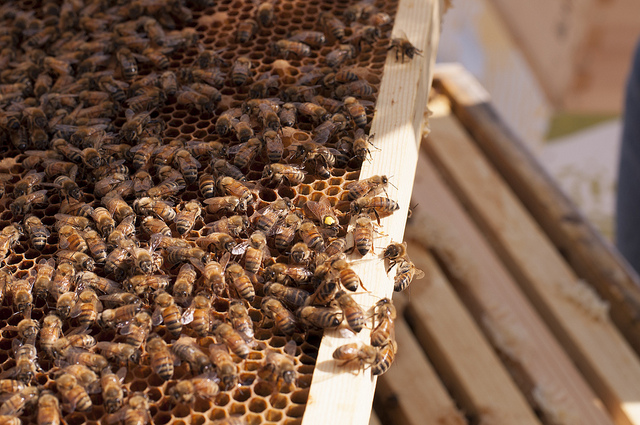近年北美和歐洲養蜂人皆發現,維持蜂群健康變得越來越困難,而且冬天的死亡率特別高。學界首次研究新菸鹼類殺蟲劑對蜂王的效果,證實新菸鹼類化學物質的確會影響蜂王健康,進而提高蜂群的死亡率。
研究證實,新菸鹼類化學物質的確會影響蜂王健康,進而提高蜂群的死亡率。圖片來源:Fauxlaroid(CC BY-ND 2.0)
新菸鹼類殺蟲劑 影響蜂王健康
瑞士伯恩大學蜜蜂健康研究所(Institute of Bee Health)和加拿大阿卡迪亞大學(Acadia University)生物學系研究團隊發表研究指出,賽速安(thiamethoxam)和可尼丁(clothianidin)兩種新菸鹼類殺蟲劑嚴重影響蜂王的生理、解剖和整體繁殖成功率,對蜂王健康極為不利。
伯恩大學資深學者Laurent Gauthier對於新研究的發現深表擔憂,但不感意外,「每年都有養蜂人指出,蜂王健康不佳是蜂群死亡的主因。」Gauthier說。
過去的研究曾發現,這些化學物質對於工蜂有致死和亞致死的效果,但對蜂王的影響不明。根據此研究結果,針對應用廣泛的新菸鹼類殺蟲劑應有更徹底的環境風險研究,以保護蜜蜂。
維繫蜂群健康 蜂王是關鍵
蜜蜂是複雜的社交有機體,每個蜂群都展現蜂王和工蜂之間的明確分工。由於每個蜂群只有一隻蜂王,牠的健康與蜂群的存亡息息相關。蜂王散發出的費洛蒙是蜂群運作的基礎,確保蜂王單一繁殖雌性個體的地位,同時讓工蜂執行維持蜂群運作所需的工作。
蜂王出生後不久就會開始一系列的交配爭奪戰,蒐集雄蜂的精子。接著蜂王會回到蜂巢下蛋,由工蜂照顧。
研究共同作者、伯恩大學學者Peter Neumann表示:「這份研究和其他近期發表的研究都顯示,我們需要對農業化學物質進行更徹底的環境風險評估,以保護生物多樣性和生態功能。」
蜜蜂和其他授粉昆蟲一樣,提供極為重要的生態系統與經濟服務。在歐洲與北美,每年數百萬的蜂群製造蜂蜜,為蘿蔔、杏仁和油菜等各種農作物授粉,其服務價值高達數十億歐元。
歐洲預防性限制噴藥 近期擬暫解禁
歐洲政府已於2013年預防性地部分限用新菸鹼類殺蟲劑賽速安、可尼丁和益達胺,並下令執行進一步的環境風險評估。接下來幾個月,歐洲將進行新的政府間審查。
今年8月底,數千英國民眾打扮成蜜蜂,擁入議會廣場抗議七月英國政府暫時開放農民噴洒有毒新菸鹼類殺蟲劑。超過50萬人連署反對政府暫時解禁。
英國環境、糧食與鄉村事務部(Defra)表示,暫時解禁是英國殺蟲劑專家委員會的建議,目的是讓蟲害重災區的油菜獲得緊急的殺蟲劑使用權。
殺蟲劑專家委員會則反對授權79%的油菜田使用新菸鹼類殺蟲劑,只建議最嚴重的5%區域有限度地、在控制之下使用。
The first study to investigate the effects of neonicotinoid insecticides on honey bee queens finds that these chemicals may contribute to bee colony mortality by affecting queen health. It strengthens calls for more thorough environmental risk assessments of these widely used pesticides to protect bees.
In recent years beekeepers have had difficulties maintaining honey bee colonies throughout North America and Europe, and often experience dramatic winter mortalities.
A research team from the Institute of Bee Health at the University of Bern, from Agroscope at the Swiss Confederation, and from the Department of Biology at Canada’s Acadia University, demonstrated in an article in the open-access journal “Scientific Reports” from the Nature Publishing Group that honey bee queens are “extremely vulnerable” to the neonicotinoids thiamethoxam and clothianidin.
The study shows profound effects on queen physiology, anatomy, and overall reproductive success.
Previous research suggests that exposure to these chemicals causese both lethal and sub-lethal effects on honey bee workers, but nothing has been known about how they may affect queens.
The observation that honey bee queens are highly vulnerable to these common neonicotinoid pesticides is “worrisome, but not surprising,” says senior author Laurent Gauthier from the Swiss Confederation’s Agroscope.
“Beekeepers frequently cite poor queen health as a major cause of colony death each year,” he said.
Honey bees are complex social organisms that demonstrate female reproductive division of labor between the queen and workers within a colony.
Queens release chemical pheromones essential for colony social organization and usually monopolize female reproduction, while workers carry out all other tasks necessary for colony maintenance.
Since there is only a single queen in each colony, queen health is crucial to colony survival.
Soon after birth, each queen will embark on a series of mating flights to collect sperm from males called drones. Afterwards, she will return to her colony to lay eggs and be cared for by workers.
Co-author Peter Neumann from Bern said, “This study, along with other recently published ones, supports calls for more thorough environmental risk assessments of agricultural chemicals to protect biodiversity and ecosystem functioning.”
Honey bees, like all insect pollinators, provide crucial ecosystem and economic services. Annually in Europe and North America, millions of honey bee colonies produce honey and contribute to the pollination of a range of agricultural crops, from carrots to almonds to oilseed rape, that is valued at billions of Euros.
In 2013 governments in Europe took a precautionary approach by partially restricting the application of the neonicotinoid pesticides thiamethoxam, clothianidin, and imidacloprid, with the mandate to perform further environmental risk assessments.
A new inter-governmental review will take place in the coming months.
In late August thousands of people, some dressed as bees, swarmed in Parliament Square to protest the July decision of the UK Parliament to temporarily allow farmers to spray the toxic neonicotinoids on their crops.
Over 500,000 people signed a petition opposing suspension of the ban.
The UK Department for Environment, Food and Rural Affairs, Defra, says it followed the advice of the UK Expert Committee on Pesticides and the agency’s chief scientist, to grant a limited emergency authorization of two pesticides in areas where oil rape crops are at risk of pest damage.
The Committee recommended rejecting authorising 79 percent of the crop area and instead recommended a much more limited and controlled application for five percent of the crop area for the worst affected areas.
Defra’s approach contrasts with other EU countries such as Denmark, which have issued unrestricted emergency authorizations for the same use of neonicotinoids.
※ 全文及圖片詳見:ENS




